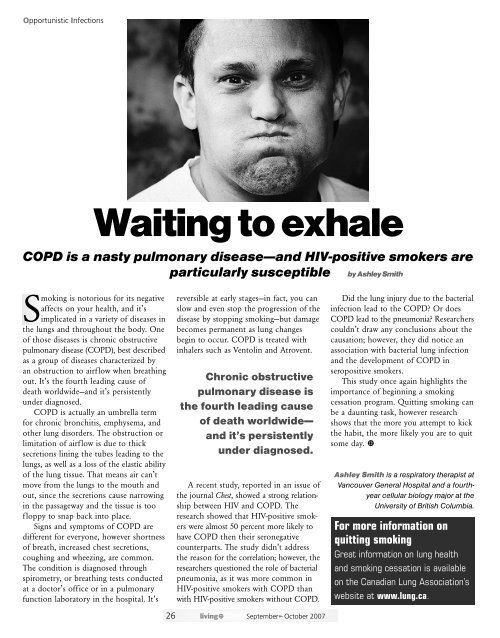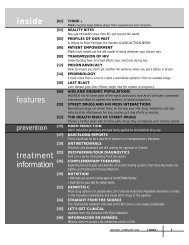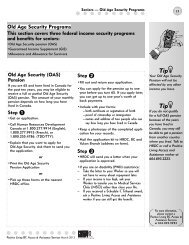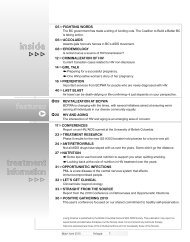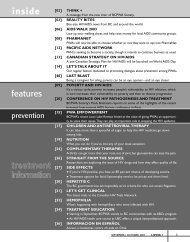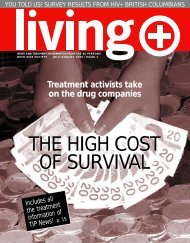iv poz mag.qxd - Positive Living BC
iv poz mag.qxd - Positive Living BC
iv poz mag.qxd - Positive Living BC
You also want an ePaper? Increase the reach of your titles
YUMPU automatically turns print PDFs into web optimized ePapers that Google loves.
issue 50.<strong>qxd</strong>:l<strong>iv</strong> <strong>poz</strong> <strong>mag</strong>.<strong>qxd</strong> 9/3/07 4:04 PM Page 26<br />
Opportunistic Infections<br />
Waiting to exhale<br />
COPD is a nasty pulmonary disease—and HIV-posit<strong>iv</strong>e smokers are<br />
particularly susceptible by Ashley Smith<br />
Smoking is notorious for its negat<strong>iv</strong>e<br />
affects on your health, and it’s<br />
implicated in a variety of diseases in<br />
the lungs and throughout the body. One<br />
of those diseases is chronic obstruct<strong>iv</strong>e<br />
pulmonary disease (COPD), best described<br />
as a group of diseases characterized by<br />
an obstruction to airflow when breathing<br />
out. It’s the fourth leading cause of<br />
death worldwide—and it’s persistently<br />
under diagnosed.<br />
COPD is actually an umbrella term<br />
for chronic bronchitis, emphysema, and<br />
other lung disorders. The obstruction or<br />
limitation of airflow is due to thick<br />
secretions lining the tubes leading to the<br />
lungs, as well as a loss of the elastic ability<br />
of the lung tissue. That means air can’t<br />
move from the lungs to the mouth and<br />
out, since the secretions cause narrowing<br />
in the passageway and the tissue is too<br />
floppy to snap back into place.<br />
Signs and symptoms of COPD are<br />
different for everyone, however shortness<br />
of breath, increased chest secretions,<br />
coughing and wheezing, are common.<br />
The condition is diagnosed through<br />
spirometry, or breathing tests conducted<br />
at a doctor’s office or in a pulmonary<br />
function laboratory in the hospital. It’s<br />
reversible at early stages—in fact, you can<br />
slow and even stop the progression of the<br />
disease by stopping smoking—but da<strong>mag</strong>e<br />
becomes permanent as lung changes<br />
begin to occur. COPD is treated with<br />
inhalers such as Ventolin and Atrovent.<br />
Chronic obstruct<strong>iv</strong>e<br />
pulmonary disease is<br />
the fourth leading cause<br />
of death worldwide—<br />
and it’s persistently<br />
under diagnosed.<br />
A recent study, reported in an issue of<br />
the journal Chest, showed a strong relationship<br />
between HIV and COPD. The<br />
research showed that HIV-posit<strong>iv</strong>e smokers<br />
were almost 50 percent more likely to<br />
have COPD then their seronegat<strong>iv</strong>e<br />
counterparts. The study didn’t address<br />
the reason for the correlation; however, the<br />
researchers questioned the role of bacterial<br />
pneumonia, as it was more common in<br />
HIV-posit<strong>iv</strong>e smokers with COPD than<br />
with HIV-posit<strong>iv</strong>e smokers without COPD.<br />
Did the lung injury due to the bacterial<br />
infection lead to the COPD? Or does<br />
COPD lead to the pneumonia? Researchers<br />
couldn’t draw any conclusions about the<br />
causation; however, they did notice an<br />
association with bacterial lung infection<br />
and the development of COPD in<br />
seroposit<strong>iv</strong>e smokers.<br />
This study once again highlights the<br />
importance of beginning a smoking<br />
cessation program. Quitting smoking can<br />
be a daunting task, however research<br />
shows that the more you attempt to kick<br />
the habit, the more likely you are to quit<br />
some day. 5<br />
Ashley Smith is a respiratory therapist at<br />
Vancouver General Hospital and a fourthyear<br />
cellular biology major at the<br />
Un<strong>iv</strong>ersity of British Columbia.<br />
For more information on<br />
quitting smoking<br />
Great information on lung health<br />
and smoking cessation is available<br />
on the Canadian Lung Association’s<br />
website at www.lung.ca.<br />
26 l<strong>iv</strong>ing5 SeptemberqOctober 2007


